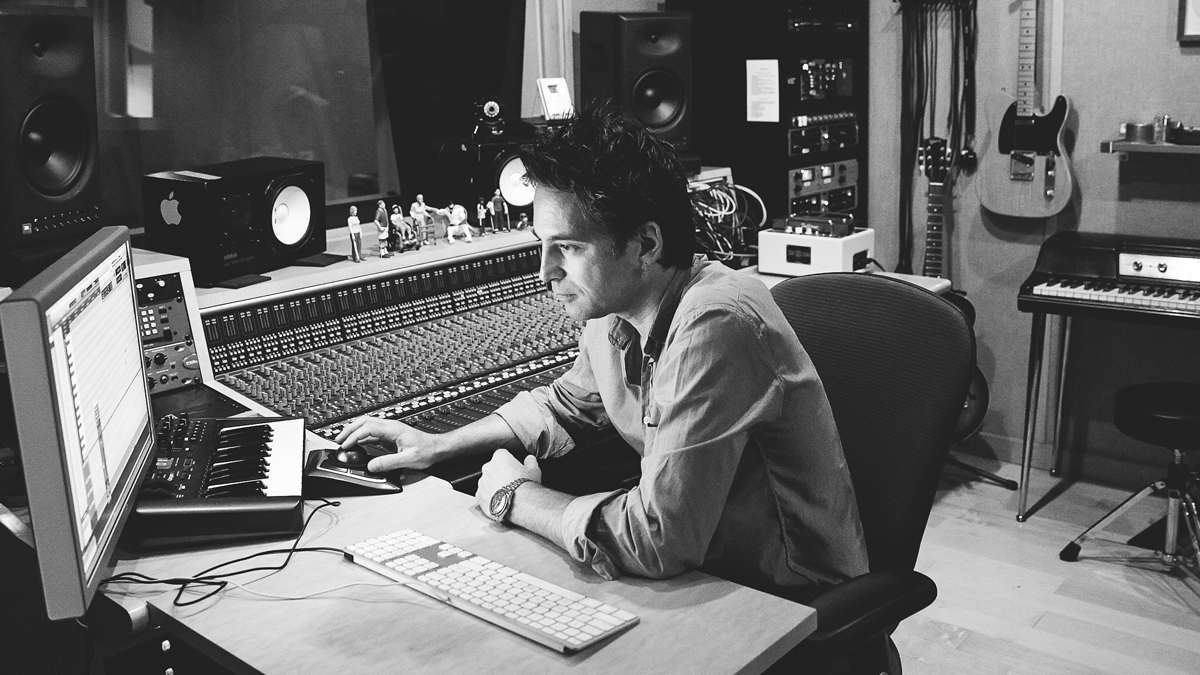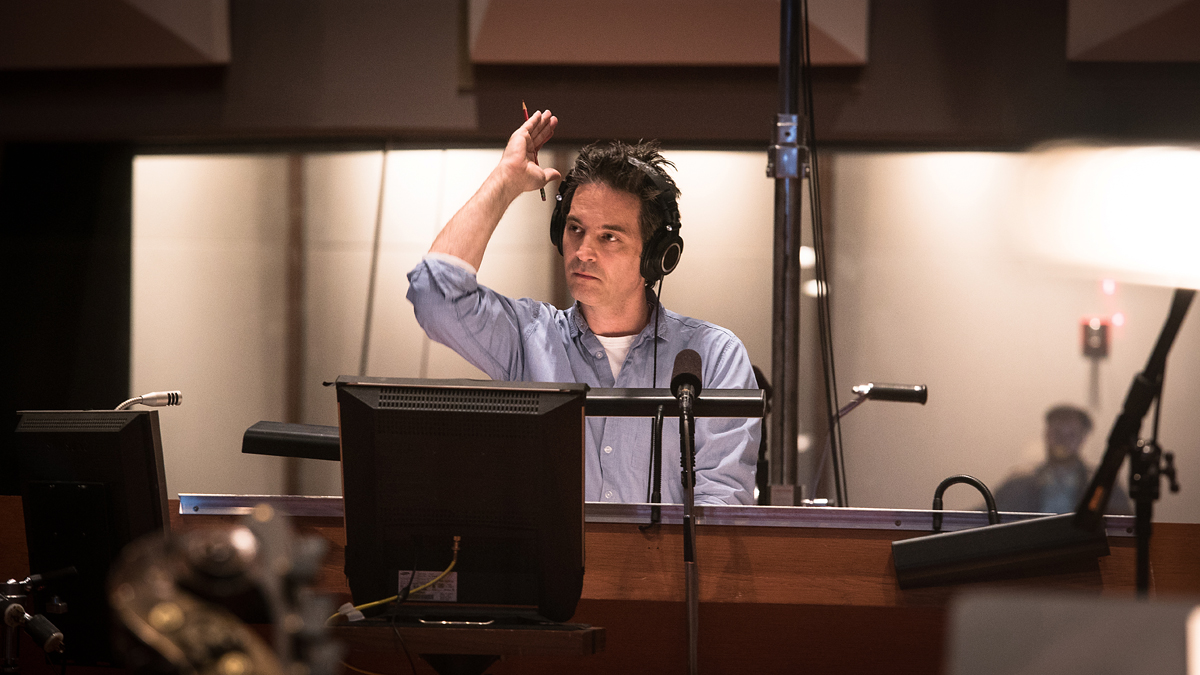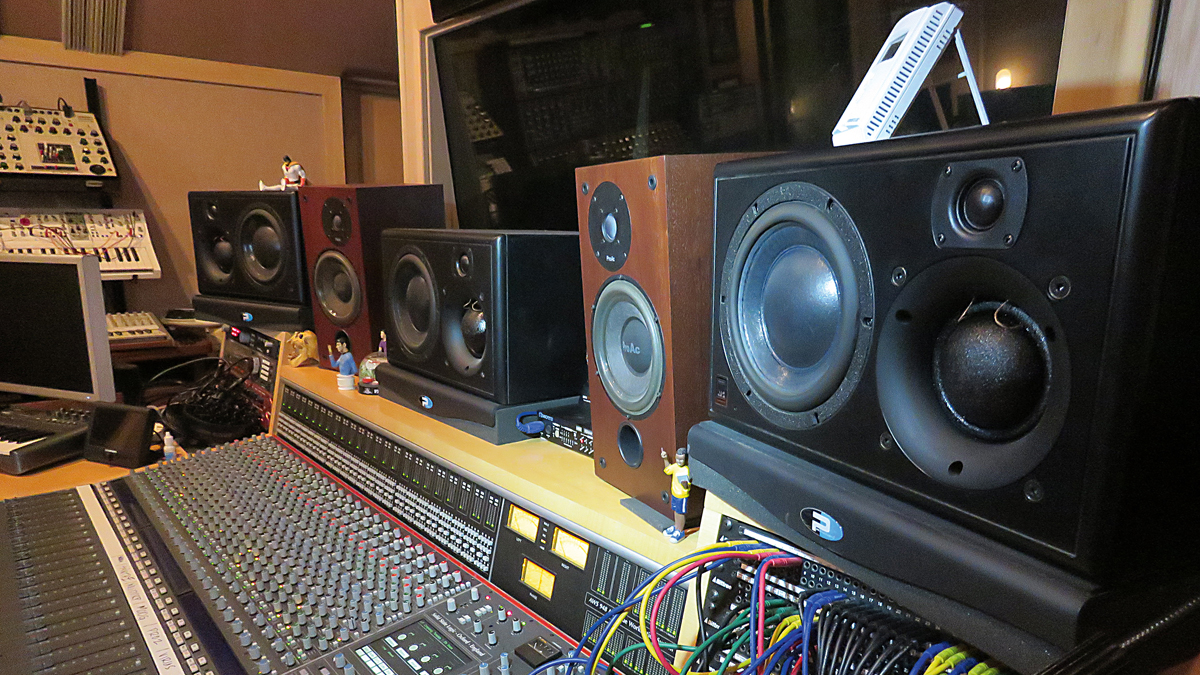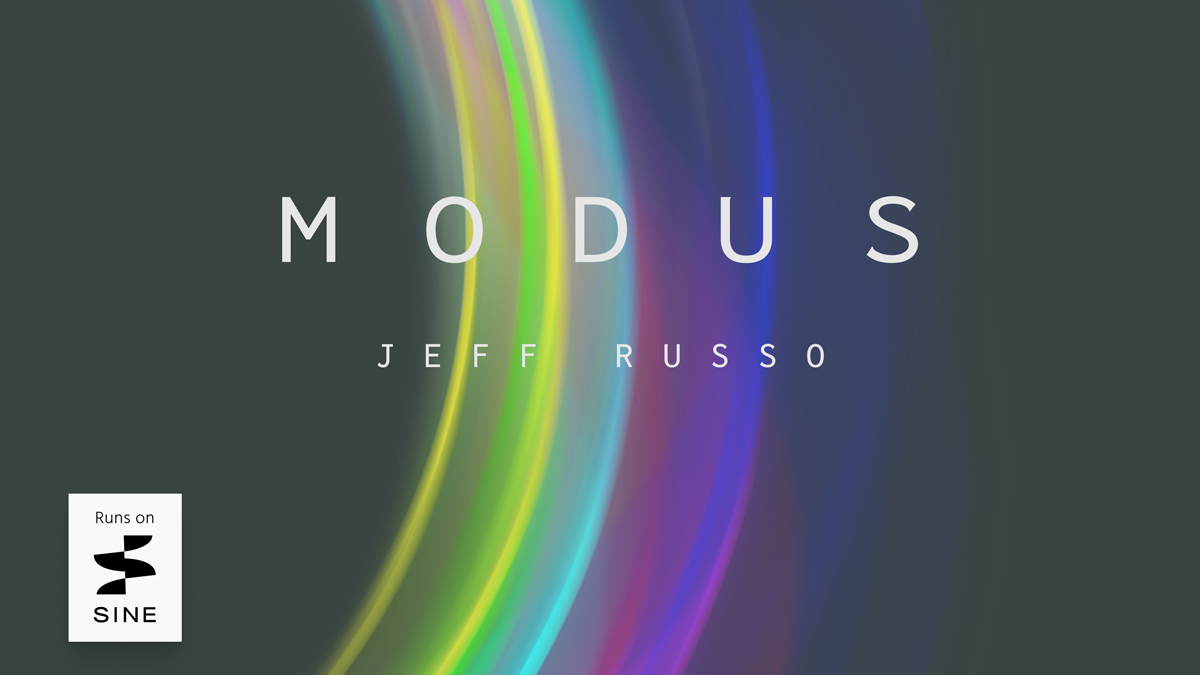Star Trek composer Jeff Russo: “I was a guy from a ‘90s alternative rock band and I’d never done an orchestral score before”
From Fargo to Discovery and Picard, the Tonic guitarist has sought out new sonic worlds

Jeff Russo never intended to be a leading film and television composer, although that is certainly what he has become.
After making his mark on the groundbreaking series Fargo, he has now become synonymous with Star Trek, composing the scores to two of the latest and most successful incarnations of the brand: Discovery and Picard.
However, it was the lure of rock ‘n’ roll that first drew Russo into music making, and he originally found fortune as guitarist in the ‘90s alternative rock band Tonic, with lead singer Emerson Hart.
Tonic were successful enough to release several albums and tour extensively, but while on a break from the band, Russo hooked up with Wendy Melvoin from the duo Wendy & Lisa and ended up writing some cues for some of the television series that they were scoring. He was consequently bitten by the film-composing bug.
“Wendy asked me if I wanted to try my hand at writing a cue for them,” Russo recalls. “They gave me all their stuff, like their samples, and I tried writing a cue and they really liked it. I ended up writing a bunch of music for them as an additional writer for about a year on Crossing Jordan and The Bionic Woman.”
That was the start of Russo’s new career in media composition, and although it would take him a couple of years to get a firm foothold in this new industry, he has now become one of the most in-demand composers in film and TV.
So high is his profile that Berlin-based library developers Orchestral Tools even helped develop a special library for him to use in his Star Trek enterprises. Modus is now commercially available, but was initially designed to offer Russo articulations and a level of control over an orchestra that was not available in other libraries.
Want all the hottest music and gear news, reviews, deals, features and more, direct to your inbox? Sign up here.
So successful was the result that, before its public availability he used the library across both Discovery and Picard.
We talked in depth with Russo about the business of film and TV composition, and while he admits that his success came from being in the right place at the right time and with the right music - and you won’t quite believe how he got the Star Trek gig - he has some solid advice for anyone wishing to gain a foothold in this exciting business.
And then there’s the Klingon choir he recorded as part of Modus to discuss. Yes, the Star Trek geek in us has been waiting to do this kind of interview for some time…
Congratulations on your success with Picard and Star Trek. We’re intrigued how you managed to make the step up from helping Wendy & Lisa out to making a name for yourself in TV and film?
“There was basically a year and a half when I did nothing but I was lucky that I had the opportunity to do that because I’d been in a successful rock band and I had made enough money that I could devote all my time to just writing music and figuring out what I was doing.
“They say that success is a combination of being in the right place at the right time and being ready. You have to be presented with an opportunity and be ready to seize that opportunity, and in 2008 I ran into a really good friend of mine [the actor] Jeremy Renner. He was doing a pilot and asked what I was doing and I was like ‘well I’m trying to get into this new space of music’ and he said ‘well let me see if they need a composer’.
I could have stayed in a class where I do sort of pop/rock/dramatic music but I didn’t want to be known as the guy from the ‘90s rock band who now does television.
“He asked the producer who asked me to send in a reel and a demo, so I wrote a demo and sent it in. Two months went by and I thought they’d given it to someone else, but then I got a phone call from the showrunner saying they’d really like to meet with me. He was in New York, I was in LA and so I literally drove to the airport and got a flight to New York!
“I went and met Noah Hawley who is the creator and producer of most of the things that I have worked on. He wrote and produced Fargo and Legion among many others.”
And how did that first show with Noah pan out?
“It was called The Unusuals which was cancelled after 10 episodes and then Noah and I did another show called My Generation which lasted two episodes, but then he called me three months after that and said ‘would you be interested in doing Fargo?’. I was like, ‘that’s one of my favourite movies of all time’, and that’s what changed my career and changed everything.
“I was nominated for an Emmy and it was in the television zeitgeist at the time and outside of what I was known to do. I was a guy from a ‘90s alternative rock band and I’d never done an orchestral score before, never even written a note of orchestral music.”
Wow, so how did you manage to get that orchestral score together?
“I just figured it out! I thought ‘well, I know melody, I know harmony, so why can’t that be played on a violin and then the chords can be played on the cello and viola?’. So instead of a melody played on a guitar, it’s played on a flute or an oboe.
“I read a book about orchestrating and basically what that told me was ‘this instrument can play in this range and do this kind of thing’. The thing that I don’t know - which an orchestrator has now helped me tons with - is what the actual sound of the orchestra can be. Having her there early on really helped me write all of the parts. But that took me out of my comfort zone and put me in a different class of composer. I could have stayed in a class where I do sort of pop/rock/dramatic music but I didn’t want to be known as the guy from the ‘90s rock band who now does television.”

How did your career progress from there?
“People heard the Fargo music and how it was so upfront and important to the narrative, and that changed the way people thought of me and led to the next thing which was The Night Of which was also really well received. That led to Legion, Altered Carbon and then The Umbrella Academy, so it’s really all about these relationships that you make. They all sort of intermingle and intertwine and then all of a sudden I’m doing Star Trek!”
Star Trek is certainly an iconic franchise to be involved with. Can you tell us a bit about how that came about?
“Well my kid happens to go to school with another kid whose mother is one of the producers of the show. She had no idea what I did and I had no idea what she did and we were on a camping trip with the school one day and talking and she asked ‘what do you do?’ and I said ‘well, I write music for film and television and I’ve just finished Fargo season 3 and The Night Of’. She said ‘I love The Night Of’ so I asked what she did and she said ‘I’m a producer working on Star Trek’! I told her I was a huge Star Trek fan and she then asked if I’d be interested in coming out and meeting them about it, so that’s how I got that job!
“It’s really all about these interpersonal relationships; I know it’s not always easy to make them but it only takes the one to become two to become four to become eight and that really changes your mindset.”
It must have been pretty amazing to be involved with a show that you are such a huge fan of?
“It was terrifying, completely terrifying! I started out as a huge fan but I am still terrified by the comparisons with some of the greatest composers like Jerry Goldsmith, Alexander Courage and Michael Giacchino - all these people who had written music for the franchise and now I get to dip my foot into that. I’ve written themes for these shows and characters that I assume will last as long as the previous ones have lasted and that is incredible to me.
“So it was a dream come true. I was a huge fan of Star Trek TNG and I wouldn’t say I dreamed of writing music for Star Trek, but I just loved Star Trek; I just watched them all. When it happened I told Emerson, our singer [with Russo’s band Tonic], and he reminded me that my girlfriend taped the episodes to send to me to play while we were on tour together! I was obsessed [with Star Trek] back then! Cut to 25 years later and I’m writing the theme to the new iteration of Star Trek and it’s incredible.”
How does it work in terms of your brief for each show? Do you get free rein?
“People ask about free rein but really you are bound by the narrative. I know what the sound of Star Trek is and I’m not going to all of a sudden make it something else - that wouldn’t make any sense. But when I sat down with the producers and discussed what I thought the music could bring to a new incarnation of Star Trek they agreed with me.
“I had this idea of really wanting to tie in the emotional construct of the show to the music. As swashbuckling as we are - and we still are - I wanted to really play music which is dictated by what characters are feeling and not necessarily what they are doing. I really wanted it to be a personal story and have it be really character-driven and have the music tie itself to those characters.
“They agreed with that and having an emotional take on these stories is an important part of the complexity of how we tell these stories. Gene Roddenberry’s vision for the future is as important today as it was back in the ‘60s. It talks about a bright future of equality and benevolence and I want to touch on that from an emotional standpoint. So I said ‘this is what I think’ and they said ‘OK, go do that’ and I went and did that and they go ‘great’ or ‘can we fix this or change this?’. There’s always that and it’s a collaborative effort in that way.”
What typically happens on a practical level? Do you get visuals or the story board?
“I don’t actually see the finished product ever. There’s just not enough time as the VFX takes so long. So I see a lot of wireframe images and I see sketches. I get a locked cut and I write music to that but that locked cut is locked for time not for what’s in it, so there will be slugs [notes] like ‘with this you’re going to see a Romulan Bird Of Prey’ or ‘it comes out of the mouth of a monster’ - things that I don’t see. So a lot of the time when I watch it on CBS All Access that is the first time I have seen the music with the final pictures!”
So as a fan that must be great as you almost get to see it like us…
“Yes but I do get to know the stories so I know what is going to happen but I don’t get to see it in its full glory until the fans get to see it. Although if I really wanted to, I could call someone and see it early. But those things are not usually done until as late as possible; it can take between nine and 13 months for VFX to be finished on an episode.”
Why do you think that people keep hiring you; do you tend to have a particular compositional philosophy?
“I’m assuming people hire me because they like what I have done in the past and think that the music I like to write is going to work for their project. They know that it is going to get done and that it will be as good as I can make it.
“I write in a very specific kind of way that is emotionally connected. That in connection with well-written characters and a well-written narrative, that is the thing that works well to me. Film makers will know how you connect with a narrative and want you to do that and bring that alive. Sometimes that might not mean having any music; the only way to make music have any meaningful impact is to have silence prior to it.”

What about your sound? Is it a mix or orchestral and electronic tools?
“[For Star Trek] Normally I utilise a full orchestra with a full wind, string and brass section. I also did a lot of percussion recording so I could program percussion because that is a lot easier than recording it as you don’t get as much mix flexibility [when recording].
“I use a lot of electronics in my studio, a lot of synths, and combine that with the orchestra and that’s really it. It’s probably 20-30% synthetic, with synths and samples, and 70-80% orchestral.”
Is the time constraint a big factor?
“Yeah, there’s an enormous amount of musical turnover and the time gets shorter and shorter as you get later in the season. It’s difficult but you definitely get used to it. I’m looking at a cue sheet right now and know that today I have to write four minutes of music.”
How much new music would an entire season of something like Star Trek require?
“It does vary from episode to episode and with two previous seasons of music, thematically, yes I can draw on all of that material except for the material that refers to characters who are not in the show any more. And in Season 3 we’re 1000 years in the future so I can’t really use certain themes but I can use the characters that still exist so why not?”
Insert quote hereThese great graduates come out and work in my studio but they don’t know anything about anything! The music lessons you learn have to be unlearned.
What plugins do you use?
“I use so many. My whole system is set up around Pro Tools and Vienna Ensemble Pro; that’s the way I am able to have these enormous templates that work for me. So those are the two tools that I really need and everything else is just like: I’ll use whatever is there and whatever is available. I’ll just open a thing and start messing with it and if it sounds good, it’s in! I’ll give it five or 10 minutes as that is all the time I have.
“I tend to not use things that I know are used over and over as that is what makes scores, TV scores especially, sound the same. That is why I am so much in favour of live musicians being part of any score. That is the thing that sets it apart from other pieces. You can feel it in the way someone’s bow hits the violin or the way someone is playing a wind instrument or hitting a drum. It really is meaningful.
“I would almost record my own samples and use them, which is another reason why [Modus] was really important to me. In doing this sample library I was recording things specifically for my use that make it easy for me.”
Finally, any advice for our readers wanting to get into TV and film scoring? Is it a case of being in the right place at the right time but that the right place is LA?
“It’s not the case that the only film makers are in LA so I’m not saying you have to come here to meet the filmmakers who will hire you. Certainly in the age of Covid-19 I know it’s harder to meet people but, generally speaking, work speaks for itself and creating a sound of your own is important, not trying to sound like or be like someone else. That’s the only way to stand out.
“But how to become successful as a media composer is beyond my comprehension. I don’t know how. I only know that if you continue to do what you do you can elevate that. It really is a question of being in the right place at the right time with the right music and the right personality coupled with the right film maker and narrative to equal something that is well beyond the sum of its parts. There is no one way to do it.
“My path was not music school and being someone’s assistant but the best way is probably to be an assistant to someone who is established. Then you get to see how the whole thing works from the inside out. They can’t teach you that in any school - Berklee, USC. These great graduates come out and work in my studio but they don’t know anything about anything! The music lessons you learn have to be unlearned. Actual music rules don’t apply. You just have to learn what the film maker wants. All that matters is: are you doing the thing that makes the filmmaker feel what they want to feel. And that’s it.”
Klingon and on

Modus started out as a project to help Jeff compose music for Star Trek but it’s now a commercially available library. Here he explains how it came about and the intricacies of recording a Klingon choir…
How did the Modus collaboration with Orchestral Tools come about?
“Hendrik [Schwarzer, MD of Orchestral Tools] called me and we started discussing various things. Composers in this industry can’t and don’t use a single library or a single company’s libraries because that wouldn’t make any sense. I use libraries across the spectrum of what’s available to me in order to get what I need done. However, I’ve been using Orchestral Tools for years as they do a thing that nobody else does - there’s a sound to their sample recordings that is really great for specific purposes.
“So, Hendrik and I were talking about Star Trek and Season 1 and in those sessions I had recorded a bunch of things which I could later use to mock up articulations because there was no way to get that across to the producers on an episodic basis. So I said to Hendrik ‘wouldn’t it be great if I could make a custom library?’ So we started talking about making one with specific articulations that really don’t exist in standard libraries that I could use in Star Trek and in Picard.”
How does it differ from other, standard orchestral libraries?
“A lot of it is based around transitions that are difficult to do in standard libraries and how instruments can transition between one another. We did ‘tension performers’ where you play some notes and then you can add other notes with a slider that creates a cacophony or a tension that would be difficult to do otherwise unless you used many different tracks.
“It’s nice to be able to do things quickly as I have to write pretty fast, so I basically wanted things to make my job easier. What I always find is that the more I work and the faster I need to go, there aren’t the tools that would make it easier, but that’s what we did here.”
So you actually used a version of this library in Star Trek?
JR: “Oh yeah, it’s all over Picard and Discovery.”
Tell us a little about the Klingon Choir?
JR: “I wanted some sort of vocal element which I had created in the past by using, adjusting and editing other choir libraries. And Hendrik was like ‘well, what if we record a custom Klingon library with a 16-person male choir?’, so I was like ‘great!’.”
And there is actually a Klingon language so are you using words from that?
“There is a little of that but it would have been a little too much. What I really wanted was just vowel sounds and grunting, things that allude to being Klingon, but not be Klingon necessarily.”


Computer Music magazine is the world’s best selling publication dedicated solely to making great music with your Mac or PC computer. Each issue it brings its lucky readers the best in cutting-edge tutorials, need-to-know, expert software reviews and even all the tools you actually need to make great music today, courtesy of our legendary CM Plugin Suite.
